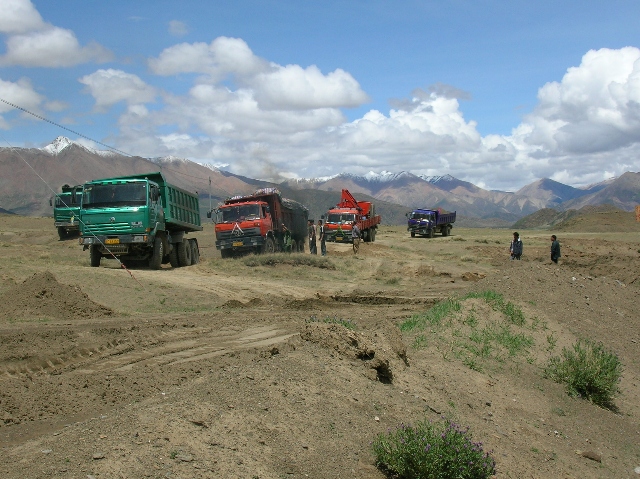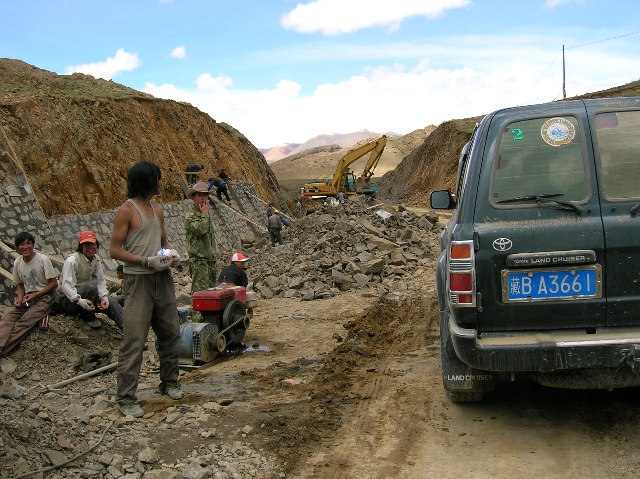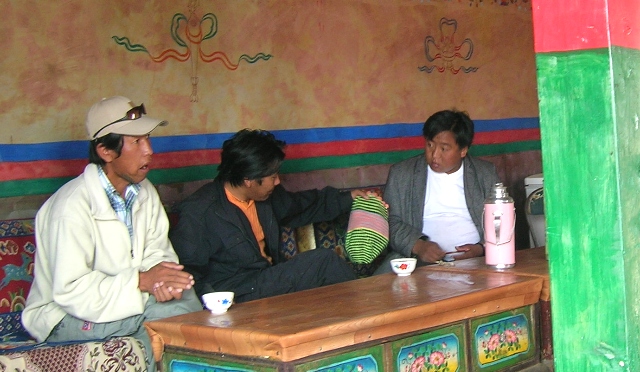| Prelude |
Day 12: SagaThe next day disaster strikes. Our driver comes out of his room and his right leg suddenly refuses to bear his weight. He can't walk: he has to be supported by two people on either side of him. Even more to the point: his accelerator and brake foot is out of action, so he can't drive. The neurologist runs him through some tests, can find nothing wrong with him, and tentatively diagnoses either hysterical paralysis or out-and-out faking - with the proviso that there could be any number of real things wrong with him that could only be diagnosed in a Western hospital with a lot of expensive equipment.Dorje is pessimistic. From here to Saga, our next stop, is a long, long trip even if we started on time. He says that in this little one-horse town it might be easy to find a driver but almost impossible to find a good one, which is what we need for the tough road ahead. We visit our driver at the local clinic, where he looks to be in a bad way - he has an I.V. and is bleeding from his arm, and his color is terrible. On the way back Pablo stops off at one of the many street pool-tables and challenges one of the locals to a game. It proves to be a tough competition: Pablo wins the first game and his opponent the rematch. I get the feeling Pablo might be getting set up for a hustle, but fortunately we have to leave anyway.
Pablo fishes me out of the cafe a little before 12: Dorje has found a driver. Our new driver gases up while we take a quick lunch, picks us up, and stops off at his house to pick up his personal supplies for a two-week trip through the wilderness of Western Tibet (3 packs of instant noodles and a toothbrush.) At the time we couldn't we happier to wipe the dust of Lhatse off our feet. However, it's a law of this Westward journey that no matter how much of a shit-hole a place seems like on the way out, it's going to seem like Paradise on earth on the way back. The tarmac ends about half a mile outside of town, and we are in for a shock. Could any road be so bad that a Tibetan driver would rather fake a disabling illness, put up with expensive and painful medical treatment, and lose thousands of yuan in income rather than drive it? Yes, it could. Of the hundreds of miles we do today, the majority are either on no discernible road at all or through the middle of a gigantic and absolutely chaotic construction site.
The Danish couple are both complaining of symptoms that sound familiar to me - nausea, malaise, lack of appetite - and I offer them my spare Gentamycin from Tashilunpo. They refuse, since they say their symptoms are not quite the same as my food poisoning-related ones, and I consider them obstinate. I am so fixated on myself that I don't even think of comparing their symptoms to what I learned about in a high-altitude medicine training course three weeks ago.
Dorje first takes us to a concrete blockhouse, but even the Danes, who are travelling on the cheap, rebel at its bleakness. I try a Chinese hotel, but the only remotely affordable rate turns out to be for renting rooms by the hour. Finally I remember another hotel on the way into town which actually turns out to be surprisingly good, considering - a little pricy at 180 yuan, but it has double beds, cable TV, and indoor plumbing. The plumbing is only available at certain hours - you can take a shower from 8 to 10, and use the toilet from 10 to 12 and from 6 to 8 am. The explanation for this is a water shortage, which starts to seem a little implausible when we find out that this is the first major town on the Tsangpo (Brahmaputra), the largest river in Asia. The water is pure glacial runoff, and even this far upstream it's wide enough that you can't tell a yak from a horse on the other bank. The hotel's windows look out onto a large Chinese military garrison. All around the hotel are signs warning us that taking photos of a military facility is a very bad idea, with very bad consequences for which they will not be responsible. Everything about this place tells me to take this warning very seriously indeed - which is why I have not a single picture of Saga. This hotel. like the Chinese one, also rents rooms by the hour, which gives us a pretty fair idea of some of the town's recreational possibilities. Our fellow guests are mostly Indian, middle-aged and middle-class. They are either going on or returning from the Kailas pilgrimage, too: for Hindus the mountain is the above of Shiva and his sexy consort, Parvati, and well as their elephant-headed son Ganesha. These pilgrims don't seem all that concerned about making it around the mountain: the party we talk to turned back just because they couldn't rent horses, which is something we hadn't even thought of doing. The Indians' food is delivered from outside the hotel in great steaming aluminium pots: everything is curried and presumably delicious. We on the other hand have to see what we can get from the restaurant across the street. It's after 10pm already, but the joint is still jumping. They have one menu for Chinese and Tibetans and another for Westerners at three times the price. Looking back I can see, based on some experiences that I had later in my trip, that at least some of the waitresses were moonlighting in the hourly-room-rental business (and I'm sure that with the garrison and a large transient population they do pretty well.) We however, have tourists' tunnel vision and all we can think about is getting some food, which is actually pretty difficult because I offend our waitress with my high-handed and imperious attitude. Unlike in the States, in China putting up with shit from customers does not fall within a waitress's job description. This night is the only occasion on this trip on which anyone talks to me about America. This is a complete change from my 2003 trip to Chengdu and Kham, when everyone wanted to talk to me about America and they all had the same thing to say. Young and old, Tai Chi players, yuppies, beggars, monks, bus drivers, engineers, ladies of easy virtue, all had the same message: 'We look up to you Americans and respect you, we admire your freedom and your economic success, but we consider your Iraq adventure to be both a folly and morally wrong. We respectfully ask that you return to the ideals for which you are so admired. ' I, of course, was able to basically agree with them. This time around, things are different. It may be partly Bush's re-election, partly China's rip-roaring economic success, but the Chinese no longer look up to us - if anything they pity us. They no longer care about our follies and catastrophes - it's our own grave after all that we are digging. The young waitress who starts the conversation is obviously desperate to get out of Saga (I don't blame her), and for her anywhere would be an improvement - even America. Even so, she can't entirely keep the condescending tone out of her voice as she says 'Meiguo hen hao' (America very good). I used to hear this all the time from people who really meant it - those were the days. |



